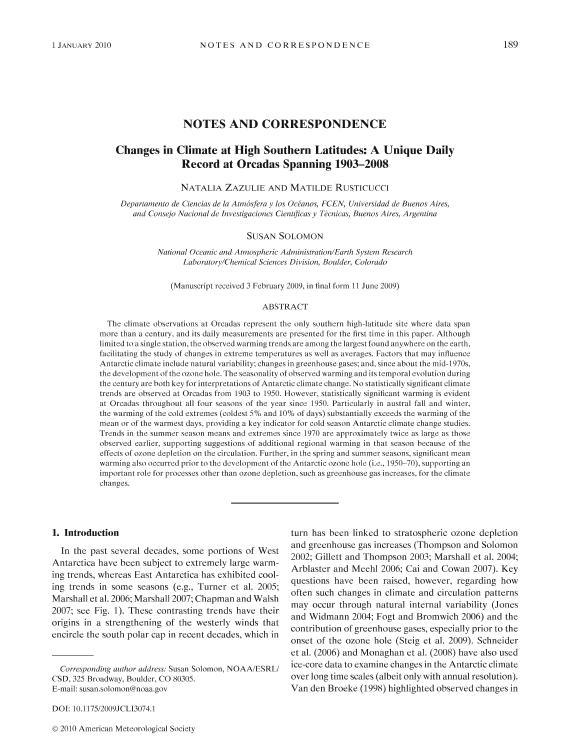Mostrar el registro sencillo del ítem
dc.contributor.author
Zazulie, Natalia

dc.contributor.author
Rusticucci, Matilde Monica

dc.contributor.author
Solomon, Susan

dc.date.available
2017-05-12T21:23:43Z
dc.date.issued
2010-01
dc.identifier.citation
Zazulie, Natalia; Rusticucci, Matilde Monica; Solomon, Susan; Changes in climate at high southern latitudes: a unique daily record at Orcadas spanning 1903–2008; American Meteorological Society; Journal Of Climate; 23; 1; 1-2010; 189-196
dc.identifier.issn
0894-8755
dc.identifier.uri
http://hdl.handle.net/11336/16431
dc.description.abstract
The climate observations at Orcadas represent the only southern high-latitude site where data span more than a century, and its daily measurements are presented for the first time in this paper. Although limited to a single station, the observed warming trends are among the largest found anywhere on the earth, facilitating the study of changes in extreme temperatures as well as averages. Factors that may influence Antarctic climate include natural variability; changes in greenhouse gases; and, since about the mid-1970s, the development of the ozone hole. The seasonality of observed warming and its temporal evolution during the century are both key for interpretations of Antarctic climate change. No statistically significant climate trends are observed at Orcadas from 1903 to 1950. However, statistically significant warming is evident at Orcadas throughout all four seasons of the year since 1950. Particularly in austral fall and winter, the warming of the cold extremes (coldest 5% and 10% of days) substantially exceeds the warming of the mean or of the warmest days, providing a key indicator for cold season Antarctic climate change studies. Trends in the summer season means and extremes since 1970 are approximately twice as large as those observed earlier, supporting suggestions of additional regional warming in that season because of the effects of ozone depletion on the circulation. Further, in the spring and summer seasons, significant mean warming also occurred prior to the development of the Antarctic ozone hole (i.e., 1950–70), supporting an important role for processes other than ozone depletion, such as greenhouse gas increases, for the climate changes.
dc.format
application/pdf
dc.language.iso
eng
dc.publisher
American Meteorological Society

dc.rights
info:eu-repo/semantics/openAccess
dc.rights.uri
https://creativecommons.org/licenses/by-nc-sa/2.5/ar/
dc.subject
Trends
dc.subject
Summer/Warm Season
dc.subject
Southern Hemisphere
dc.subject
Climate Change
dc.subject.classification
Investigación Climatológica

dc.subject.classification
Ciencias de la Tierra y relacionadas con el Medio Ambiente

dc.subject.classification
CIENCIAS NATURALES Y EXACTAS

dc.title
Changes in climate at high southern latitudes: a unique daily record at Orcadas spanning 1903–2008
dc.type
info:eu-repo/semantics/article
dc.type
info:ar-repo/semantics/artículo
dc.type
info:eu-repo/semantics/publishedVersion
dc.date.updated
2017-05-11T20:57:07Z
dc.identifier.eissn
1520-0442
dc.journal.volume
23
dc.journal.number
1
dc.journal.pagination
189-196
dc.journal.pais
Estados Unidos

dc.journal.ciudad
Massachusetts
dc.description.fil
Fil: Zazulie, Natalia. Universidad de Buenos Aires. Facultad de Ciencias Exactas y Naturales. Departamento de Ciencias de la Atmósfera y los Océanos; Argentina. Consejo Nacional de Investigaciones Científicas y Técnicas; Argentina
dc.description.fil
Fil: Rusticucci, Matilde Monica. Universidad de Buenos Aires. Facultad de Ciencias Exactas y Naturales. Departamento de Ciencias de la Atmósfera y los Océanos; Argentina. Consejo Nacional de Investigaciones Científicas y Técnicas; Argentina
dc.description.fil
Fil: Solomon, Susan. State University Of Colorado Boulder; Estados Unidos
dc.journal.title
Journal Of Climate

dc.relation.alternativeid
info:eu-repo/semantics/altIdentifier/doi/http://dx.doi.org/10.1175/2009JCLI3074.1
dc.relation.alternativeid
info:eu-repo/semantics/altIdentifier/url/http://journals.ametsoc.org/doi/abs/10.1175/2009JCLI3074.1
Archivos asociados
